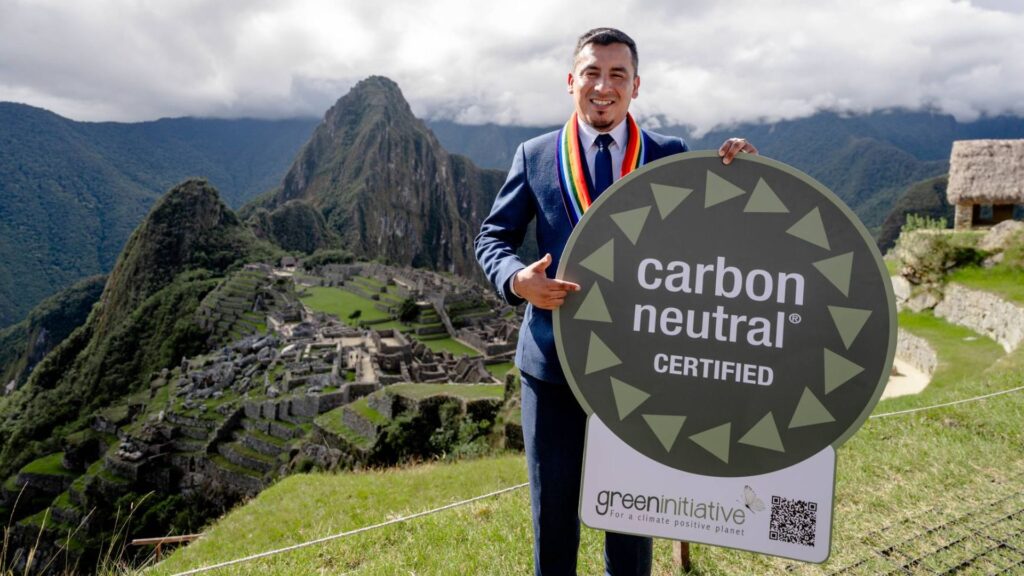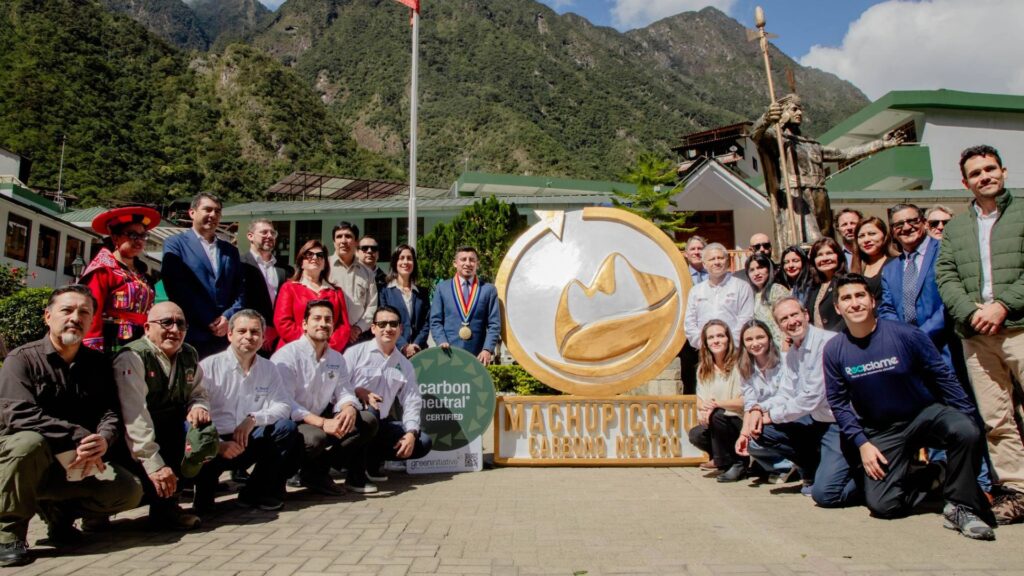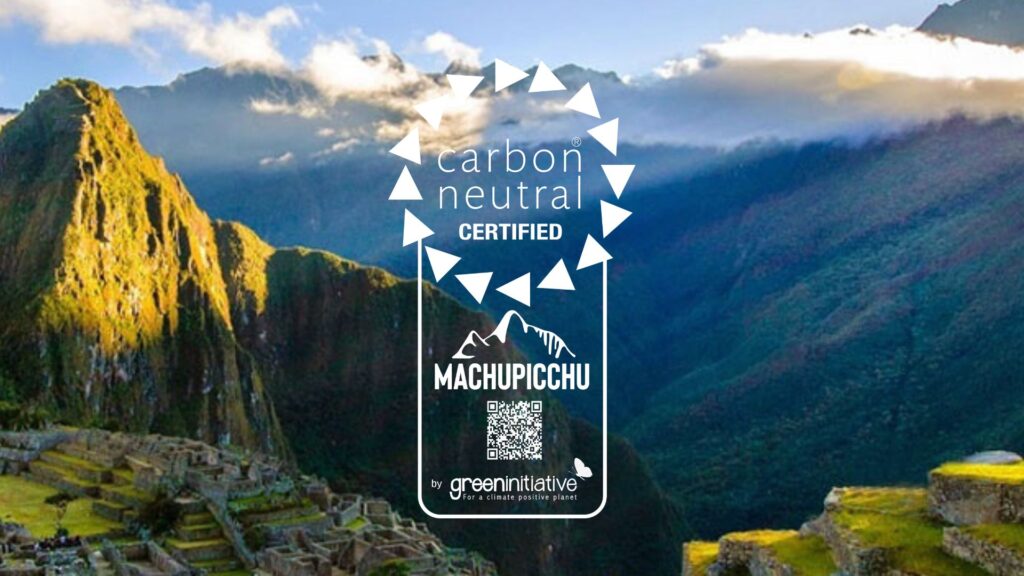Lima, June 2024 – Machu Picchu has renewed its certification as the First Carbon Neutral UNESCO Designated Site. This prestigious certification, awarded by Green Initiative, underscores Machu Picchu’s commitment to sustainability and decarbonization. Originally certified in 2021, Machu Picchu continues to lead in sustainable tourism through innovative environmental initiatives and collaborative efforts.
Significant Reductions in Carbon Emissions
Since its initial certification in 2021, Machu Picchu has made substantial progress in reducing carbon emissions. The total carbon footprint for 2022 was 7,117.55 tCO2eq, representing an 18.77% reduction compared to the 2019 baseline. This impressive reduction was achieved through several key strategies:
- Improved Waste Management: Initiatives such as the installation of a PET plastic and cardboard compactor plant and an organic waste pyrolysis plant have significantly reduced waste volume and facilitated recycling.
- Sustainable Energy Use: The adoption of biodiesel made from recycled oils has decreased reliance on fossil fuels.
- Electric Vehicles: The use of electric vehicles for local transportation within the Machu Picchu District has replaced fossil fuel vehicles, further reducing emissions.

Decarbonization Strategies, Innovative Waste Management and Circular Economy, and Nature Positive Initiatives
Machu Picchu’s approach to waste management and circular economy has been integral to maintaining its carbon-neutral status. The renewal of Machu Picchu’s carbon-neutral certification highlights the success of various decarbonization strategies. These include:
- PET Plastic and Cardboard Compactor Plant: Reduces waste volume and facilitates recycling.
- Biodiesel Plant: Converts waste oils from local restaurants and casinos into biodiesel.
- Organic Waste Pyrolysis Plant: Transforms organic waste into biochar, used as organic fertilizer.
- Glass Crushers: Recycle bottles into sand for construction and ornamentation.
- Ecological Restoration: With 6,596 native trees planted to enhance carbon sequestration and restore local ecosystems.
These measures have substantially reduced Machu Picchu’s carbon footprint, making it a model for sustainable tourism worldwide.
Key Highlights:
- The total carbon footprint for the 2022 period was 7,117.55 tCO2eq, 18.77% lower compared to the 2019 baseline year, despite being in the midst of recovery from the COVID-19 crisis.
- The emissions per tourist indicator showed a reduction equal to 4.73 kgCO2eq per tourist (-18.77%) when comparing the same number of tourists in the base year period 2019 and the current period 2022.
- Actions taken for waste management have led to a remarkable reduction of -40.80 tCO2eq, 2.5 times more than what was reduced in 2019.
- The carbon capture from the ecological restoration areas and historical-cultural zones of the Machu Picchu District was equal to 5,055.17 tCO2eq.
- The emissions balance was 2,088.34 tCO2eq.
- The carbon footprint of Machu Picchu has been 100% offset with 2,155 carbon credits generated by the REDD+ Brazil Nut Concessions project, developed by the Peruvian company Bosques Amazónicos (BAM). This project protects over 600,000 hectares of uniquely megadiverse forests along with more than 800 partner Brazil nut harvesting families in Madre de Dios, Peru.
- This work was analyzed and validated by the UN Climate Change’s Climate Neutral Now team.
Collaborative Efforts for Sustainability
This achievement was made possible through the collaboration of various stakeholders, including the Municipality of Machu Picchu, Grupo AJE, Inkaterra, and Tetra Pak. Support also came from World Xchange, Luz del Sur, Bosques Amazónicos (BAM), Latam, PROMPERÚ, and the National Chamber of Tourism of Peru (CANATUR).

“We are proud to announce that Machupicchu renews its ‘First Carbon Neutral’ certificate. This achievement represents a significant milestone in our effort to promote circular economy models and sustainable cities, where for example, we give new life to bottles, such as Cielo Alcalina which is made 100% from recycled bottles,” says Jorge López-Doriga, Chief Communications and Sustentability Officer in AJE Group.
“As a pioneer of regenerative tourism in Peru, Inkaterra is committed to conserving the natural heritage of Machupicchu,” states José Koechlin, founding president of Inkaterra. “This alliance is a success story about the goals that can be achieved when public and private sectors work hand in hand. With the support of the local community, the first destination in Latin America with a circular economy has been achieved. We Peruvians enjoy the privilege of having this cultural and natural heritage of humanity, which entails the great responsibility of caring for it for future generations.”
“The result achieved in Machupicchu is the result of significant collaborative effort; however, it is necessary to attract more financial and intellectual capital, with the help of national and international actors, to expand and scale up the accumulated experience. The world needs references in climate action in tourism, and Machupicchu can be a great laboratory for climate action and circular economy of global interest,” states Tatiana Otaviano, Head of Relationship Management at Green Initiative.
Mónica Montes, Sustainability Manager of Tetra Pak Andina, specifies the valuable role that the actors in the recycling chain in the country have played in achieving such an important achievement. “At Tetra Pak, we firmly believe in shared responsibility, so the contribution of major allies such as AJE, Inkaterra, the State, among others, allows the renewal of the certification of Machupicchu as a Carbon Neutral Destination to be a testimony of success. From Tetra Pak, we will continue with the commitment to make our packaging contribute to the circular economy and significantly reduce our carbon footprint, thus contributing to a better future,” commented the executive.
Global Recognition and Future Goals
Machu Picchu’s renewed carbon-neutral certification has received international recognition from UN Tourism, UNESCO, and UN Climate Change. Publications like Lonely Planet have also highlighted this achievement, naming Machu Picchu as one of the ‘Top 10 Best World Tourism News’ in 2021.
The ongoing efforts to maintain and enhance Machu Picchu’s sustainability practices demonstrate a broader commitment to combating climate change. This milestone serves as an inspiration for other tourist destinations worldwide, showcasing the benefits of integrating climate action into tourism.
As we celebrate this achievement, it is essential to continue fostering public and private partnerships and securing investments to sustain and expand these efforts. Machu Picchu’s journey towards a fully decarbonized future is a beacon of hope and a blueprint for sustainable tourism globally.





